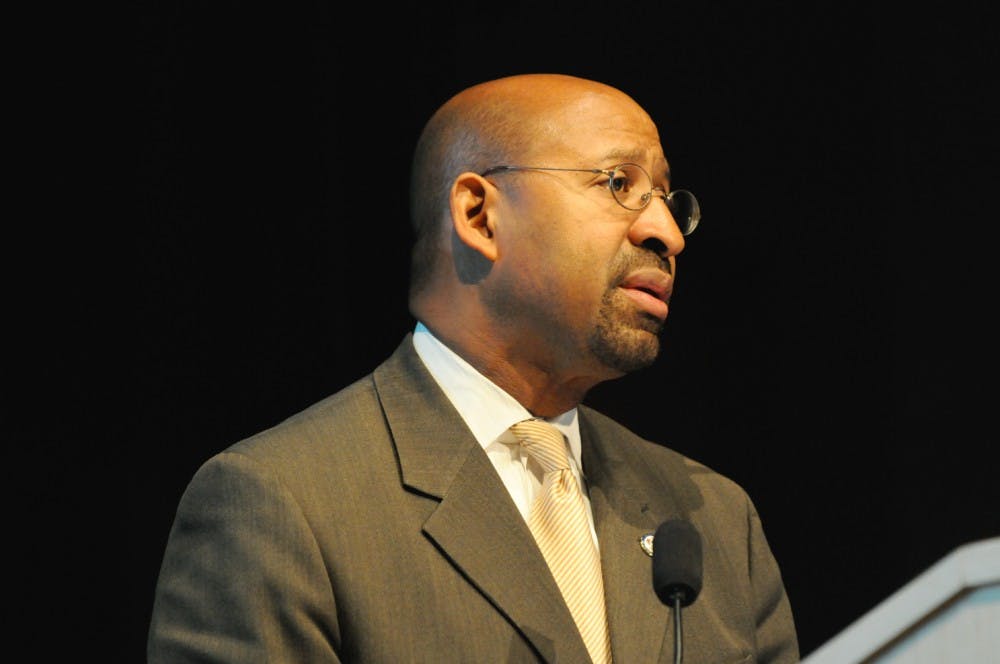
On Thursday, the Philadelphia City Council approved a resolution asking Mayor Michael Nutter to request PILOT payments from “mega-nonprofits” in the area.
Despite City Council's endorsement of PILOTs in last week's resolution, Mayor Michael Nutter is not so easily convinced of their benefit.
On Thursday, the Council approved a resolution asking the mayor to request PILOTs, or payments in lieu of taxes, from “mega-nonprofits” in the area.
PILOTs are contributions that nonprofits can make to local governments to account for the usage of essential city services like trash removal and fire protection.
Under Pennsylvania state law, nonprofits like Penn are exempt from paying property taxes. Renewed calls for PILOT agreements come in the midst of an $80 million budget deficit in the School District of Philadelphia. Property taxes go in large part towards funding public schools.
The resolution, which was introduced by 1986 College graduate and Councilman W. Wilson Goode, passed on a 15-1 vote. Despite its landslide approval in the Council, Nutter has not expressed support for PILOTs.
“I don't think a PILOT program here or, demonstrated in any other city, is the kind of sustainable, long-term, serious funding that our school system needs,” Nutter told the Philadelphia Inquirer on Saturday.
The mayor also emphasized that he “can’t order the nonprofits to give us money for anything.” PILOTs are, as Nutter suggests, voluntary payments. Absent a change in the tax code affecting nonprofits, the decision to make voluntary contributions to the city rests ultimately with the nonprofit institution itself.
However, PILOT agreements have existed in the past in Philadelphia.
From 1995 to 2000, former Mayor Ed Rendell’s administration set up a PILOT agreement with major nonprofits in the city. Under that plan, Penn contributed $1.93 million annually.
Rendell, a 1965 College graduate and instructor in the Fels Institute of Government, has remained supportive of greater nonprofit contributions to the city government.
In a 2013 Philadelphia Inquirer article, he said, “It’s hard to say the University of Pennsylvania is a charity.” Rendell and others have argued that large nonprofits like Penn that do not act as charities should not receive such generous tax exemptions.
The University has remained staunchly against PILOT payments. Penn officials have cited the University’s $800,000 annual contribution to the Penn Alexander School, a total of $106 million in revenue through taxes in the 2014 fiscal year and other programs and initiatives in public schools, like Lea Elementary School, as evidence of Penn’s contributions to the city.
The Student Labor Action Project is the principle force on campus behind the movement for Penn to pay PILOTs. Members of SLAP spoke with Councilman Goode about the resolution and College sophomore and SLAP member Devan Spear even testified in front of the Council last week about the issue.
SLAP members view Mayor Nutter’s reticence to request PILOT payments as counterintuitive to funding the school district.
“We don’t know why he wouldn’t want this funding if he could get it,” Engineering sophomore and SLAP member Lucas Dagostino said.
Dagostino agreed with Nutter that “other sources of funding are important and that PILOTs [alone] won’t solve the funding deficit.” However, nonprofits like Penn should be held accountable, Dagostino added.
“Regardless of Mayor Nutter’s opinion, the vast majority of City Council wants PILOTs,” he said. Nutter acknowledged to the Inquirer that he would still review the resolution.
The coming mayoral election could shift government support of PILOTs. Several mayoral candidates — including Doug Oliver, Jim Kenney and Nelson Diaz — have all gone on the record supporting PILOT payments, with the other major candidates broadly supporting greater nonprofit contributions as well.
The Daily Pennsylvanian is an independent, student-run newspaper. Please consider making a donation to support the coverage that shapes the University. Your generosity ensures a future of strong journalism at Penn.
DonatePlease note All comments are eligible for publication in The Daily Pennsylvanian.







